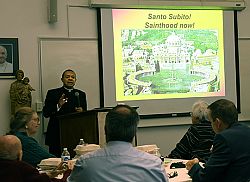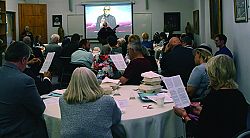Diocese hosts Salt Lake Interfaith Roundtable for presentation on Saint Oscar Romero

SALT LAKE CITY — A presentation on Saint Oscar Romero at an Oct. 18 Salt Lake Interfaith Roundtable event hosted by the Diocese of Salt Lake City at the Pastoral Center visibly moved several people in attendance, but perhaps none was more affected than El Salvadoran émigré Jose Bonilla, associate director of the MOSAIC Interfaith Ministry.
Prior to coming to the United States 43 years ago, Bonilla had lived in San Salvador and often played his guitar for the poor in the plaza near the church where St. Oscar Romero was assassinated in 1980 while celebrating Mass.
The Oct. 18 event included a presentation by Lorena Needham about the saint’s life and the events that led to his canonization. Needham is a lay ecclesial minister with the diocese.
St. Oscar Romero was born on Aug. 17, 1917 in El Salvador. In the early days of his priesthood, he did not involve himself in politics, but that changed when his friend and colleague Father Rutillo Grande, SJ, was killed for helping the peasants. After that, St. Oscar Romero, who was then the Archbishop of San Salvador, began to speak out against his country’s government at the time, which was persecuting the people and many members of the clergy.
“In the face of all this persecution of the people Oscar Romero was not silent,” Needham said. “This is an example of one of the things that he said that he was called for: ‘The Church hears the cry of the poor.’”
“He knew that he was being condemned to die by his choices,” Needham added. “He didn’t hate the government; he just wanted them to treat the people properly. He was a very, very, very dedicated priest, and he wanted to be true to the Church.”
“Oscar Arnulfo Romero, who died as a martyr and a prophet, was a great source of hope for millions of oppressed and impoverished Salvadorans,” Needham said. “And he was a great threat to the greed and arrogance of the oligarchy, as well as the government, the ruling government officials, simply by insisting that people would obey the Ten Commandments.”
Needham concluded her presentation with a song in Spanish about Oscar Romero, during which Bonilla wept without hiding his tears.
“What she said was very relevant, but it is important that action be taken against regimes like that of El Salvador that exist in the world today,” Bonilla said. “We need more input; just prayer is OK, but the people have to take action. People have to make changes and you know, I see too much apathy in the world, and people choosing sides. That’s not right because we are people who have got to get all together. This is not yes, this or that. We have to say save the people so much.”
Needham’s presentation was preceded by an explanation of the Church’s canonization process, given by Father Langes Silva, the diocesan judicial vicar. Following Needham’s presentation, Mike Stovall with The Family Federation for World Peace and Unification briefly told of the persecution his church members are enduring in Japan. Pastor Curtis Price of the Free Baptist Church of Salt Lake City also spoke briefly before offering the meeting’s closing prayer.
“Never has the work of the roundtable been more important than at times like this,” Pastor Price said. “We demonstrate a different way of being in the world together here where we work so hard to reach across faiths, communities and to build bridges between one another – Jew, Muslim, Christian and everything in between – … coming together to seek a common humanity to transcend our differences and to come into a place of appreciation and love for one another and one another’s space.”
Rev. Libby Hunter, a deacon at St. Mark’s Cathedral, said she appreciated the presentations.
“I think this is a significant time when we want to be looking at people as our sisters and brothers and not hating people, putting them in boxes, identifying people by race or by culture, or by gender, or by an ethnicity or by a country,” she said. “It’s just terrifying to me, and I think this is one of the ways we can make a difference in the world.”
The Interfaith Roundtable was formed in 1999 by the Salt Lake Organizing Committee for the 2002 Olympic Winter Games to fulfill the Olympic Charter requirements to provide religious support for athletes and families. When the Games concluded, members of the Interfaith Roundtable decided to continue to meet monthly from September through May to collaborate on mutual interfaith goals.
© Copyright 2024 The Diocese of Salt Lake City. All rights reserved.


Stay Connected With Us